U bent hier
Internet Archive
AI Audio Challenge: Audio Restoration based on Expert Examples
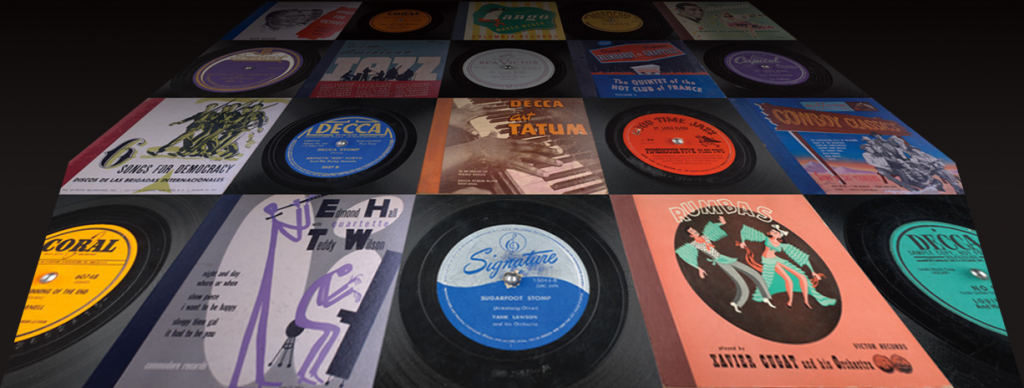 http://great78.archive.org/
http://great78.archive.org/
Hopefully we have a dataset primed for AI researchers to do something really useful, and fun– how to take noise out of digitized 78rpm records.
The Internet Archive has 1,600 examples of quality human restorations of 78rpm records where the best tools were used to ‘lightly restore’ the audio files. This takes away scratchy surface noise while trying not to impair the music or speech. In the items are files in those items are the unrestored originals that were used.
But then the Internet Archive has over 400,000 unrestored files that are quite scratchy and difficult to listen to.
The goal is, or rather the hope is, that a program that can take all or many of the 400,000 unrestored records and make them much better. How hard this is is unknown, but hopefully it is a fun project to work on.
Many of the recordings are great and worth the effort. Please comment on this post if you are interested in diving in.
The post AI Audio Challenge: Audio Restoration based on Expert Examples appeared first on Internet Archive Blogs.
National Library Week 2023: Charles, metadata
To celebrate National Library Week 2023, we are introducing readers to four staff members who work behind the scenes at the Internet Archive, helping connect patrons with our collections, services and programs.
Working from his home office in Wellington, New Zealand, Charles Horn is a metadata wrangler for the Internet Archive. He feels lucky to live near the Pacific Ocean, where he can kayak through the local marine reserve in his spare time — while also working with others internationally to improve access to information.
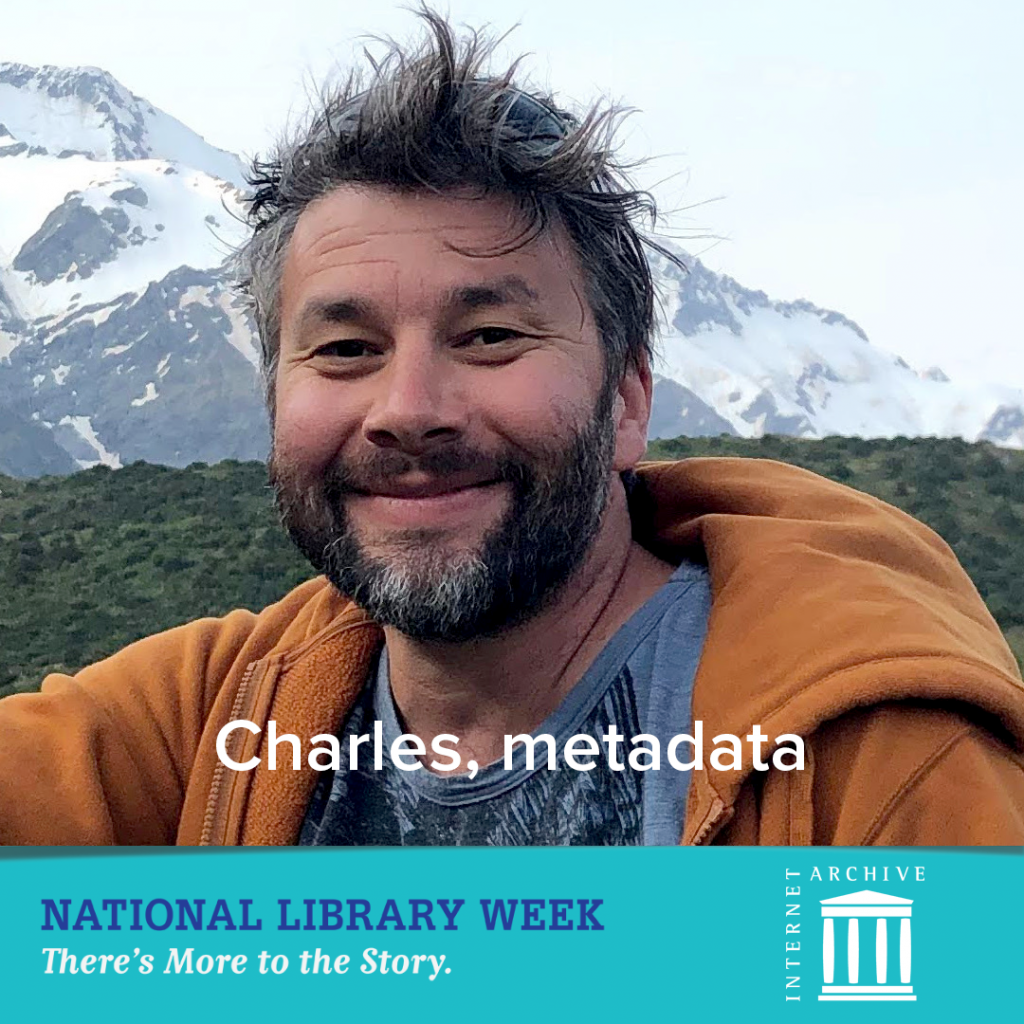
Horn is responsible for managing, matching and sharing bibliographic data at scale. He works with software tools and formatting to make sense of often obscure bibliographic data when opportunities present themselves through donations and patron requests. Call him a digital librarian or data scientist, his goal is to improve discoverability of materials for users online.
In New Zealand, Horn earned a double degree in classical studies and information systems at the University of Canterbury. His interest in ancient Greek language and literature meant he spent a lot of time in libraries. He worked as a software developer at various companies before joining the Internet Archive five years ago.
“It’s nice to work for a nonprofit that is having an impact around the world,” said Horn, who works closely with the Open Libraries project and is currently working on standard formatting for public domain audiobook recordings, like those available through Librivox.
Preserving older materials with modern information practices is challenging, he said, as well as fun and entertaining.
“A lot of digital content is potentially quite ephemeral—and that’s where a lot of culture is happening,” he said. “Being a digital archivist or librarian, you need to think about how you’d want it preserved or cataloged for the future.”
Horn said he disagrees with people outside of libraries who think the institution is no longer relevant because everything’s online. It’s the transition to digital that makes libraries all the more relevant today. “There are researchers who need to work with increasing quantities of information,” he said. “Libraries and librarianship are incredibly relevant today, especially in the digital realm.”
Tell us something about your role at the Internet Archive that most people wouldn’t know about.
I work on the metadata of about 5 million books for which we have full scans, and frequently process tens of millions more as we work with partners. I enjoy the fact that for any arbitrary book there is a good chance I have made a small addition, improvement, or added a link on a bibliographic record hosted on archive.org or openlibrary.org, making that information slightly more connected, more relevant, and more accessible.
What’s your secret talent no one knows about?
I have been teaching myself Quantum computing and Information science, using online resources and physical books. For a library related task, I designed and implemented a quantum circuit to validate ISBNs using a single qubit.
What has been your greatest achievement (so far) at the Internet Archive?
Working with library partners to make practical controlled digital lending a reality and enabling access to hard to locate works for an audience that would be otherwise unable to access them.
Currently reading: The Bridge, by Iain Banks, and From Counterculture to Cyberculture, by Fred Turner. Looking forward to Breakable Things, by Cassandra Khaw when it arrives from Better World Books.
The post National Library Week 2023: Charles, metadata appeared first on Internet Archive Blogs.
National Library Week 2023: There’s More to the Story
Libraries are full of stories in a variety of formats from picture books to large print, audiobooks to ebooks, and more. But there’s so much more to the story. To celebrate the American Library Association’s National Library Week 2023, we are introducing readers to four staff members who work behind the scenes at the Internet Archive, helping connect patrons with our collections, services and programs.
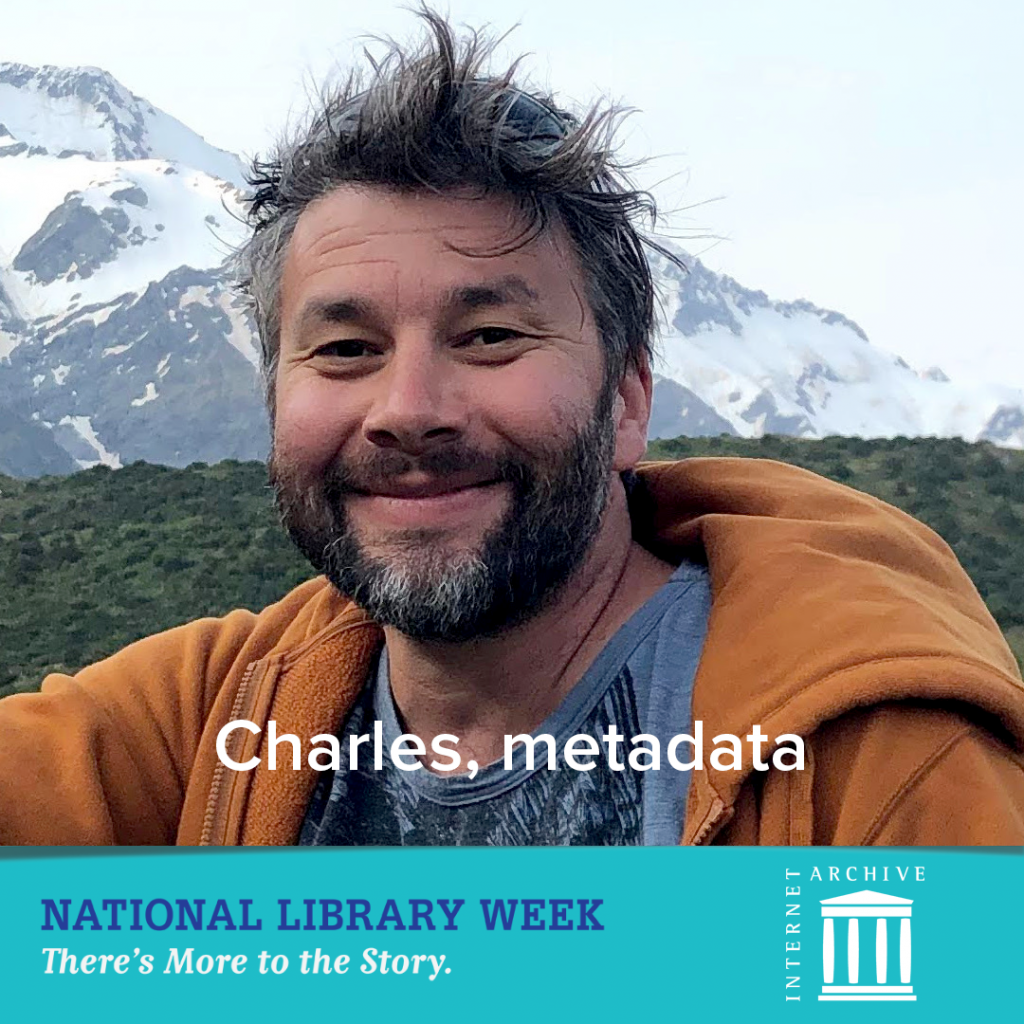
Charles, metadata
What does it take to manage, match & share bibliographic metadata at scale? Check in with our “metadata wrangler,” Charles.
Liz, donations (coming Tuesday, April 25)
Caitlin, events (coming Wednesday, April 26)
Brenton, user experience (coming Thursday, April 27)
The post National Library Week 2023: There’s More to the Story appeared first on Internet Archive Blogs.
Book Talk: Against Progress
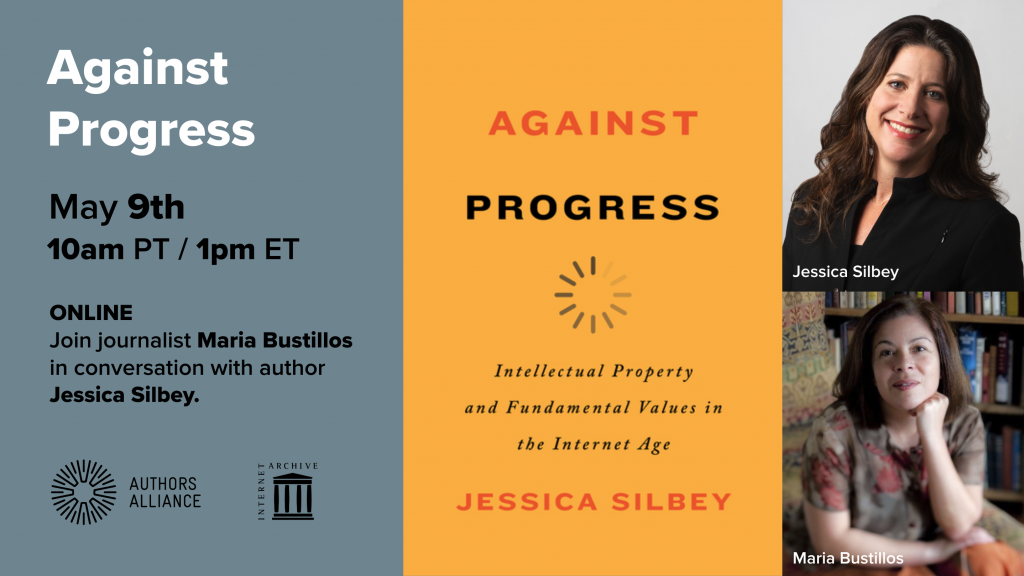
Join journalist MARIA BUSTILLOS for a virtual book talk with author & professor of law JESSICA SILBEY for her latest book, AGAINST PROGRESS.
REGISTER NOWWhen first written into the Constitution, intellectual property aimed to facilitate “progress of science and the useful arts” by granting rights to authors and inventors. Today, when rapid technological evolution accompanies growing wealth inequality and political and social divisiveness, the constitutional goal of “progress” may pertain to more basic, human values, redirecting IP’s emphasis to the commonweal instead of private interests.
Against Progress considers contemporary debates about intellectual property law as concerning the relationship between the constitutional mandate of progress and fundamental values, such as equality, privacy, and distributive justice, that are increasingly challenged in today’s internet age. Following a legal analysis of various intellectual property court cases, Jessica Silbey examines the experiences of everyday creators and innovators navigating ownership, sharing, and sustainability within the internet eco-system and current IP laws. Crucially, the book encourages refiguring the substance of “progress” and the function of intellectual property in terms that demonstrate the urgency of art and science to social justice today.
Purchase Against Progress from Stanford University Press.
JESSICA SILBEY is Professor of Law at the Boston University School of Law. She is the author of Against Progress: Intellectual Property and Fundamental Values in the Internet Age (Stanford, 2022), The Eureka Myth: Creators, Innovators, and Everyday Intellectual Property (Stanford, 2015), and was a Guggenheim Fellow in 2018.
BOOK TALK: AGAINST PROGRESS
May 9 @ 10am PT / 1pm ET
Register now for the free, virtual event
The post Book Talk: Against Progress appeared first on Internet Archive Blogs.
San Francisco Board of Supervisors Unanimously Passes Resolution in Support of Digital Rights For Libraries
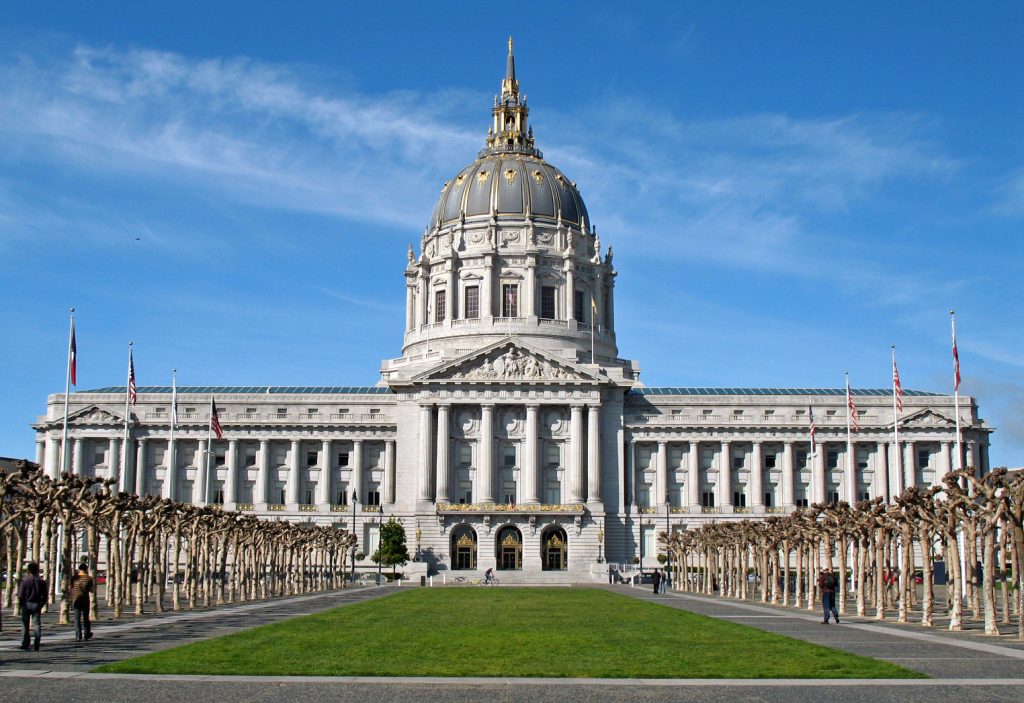 San Francisco City Hall from east end of Civic Center Plaza
San Francisco City Hall from east end of Civic Center Plaza
In a stunning show of support for libraries, late yesterday afternoon the San Francisco Board of Supervisors voted unanimously to support a resolution backing the Internet Archive and the digital rights of all libraries.
Supervisor Connie Chan, whose district includes the Internet Archive, authored the legislation and brought the resolution before the Board. “At a time when we are seeing an increase in censorship and book bans across the country, we must move to preserve free access to information,” said Supervisor Chan. “I am proud to stand with the Internet Archive, our Richmond District neighbor, and digital libraries throughout the United States.”
WATCH Supervisor Chan introduce the resolution:
What’s in the resolution?The resolution is a powerful statement in support of libraries, beginning:
Resolution recognizing the irreplaceable public value of libraries, including online libraries like the Internet Archive, and the essential rights of all libraries to own, preserve, and lend both digital and print books to the residents of San Francisco and the wider public; supporting the Internet Archive and its public service mission; and urging the California State Legislature and the United States Congress to support digital rights for libraries, including controlled digital lending and the option for libraries to own their digital collections. Rally on the steps of San Francisco City Hall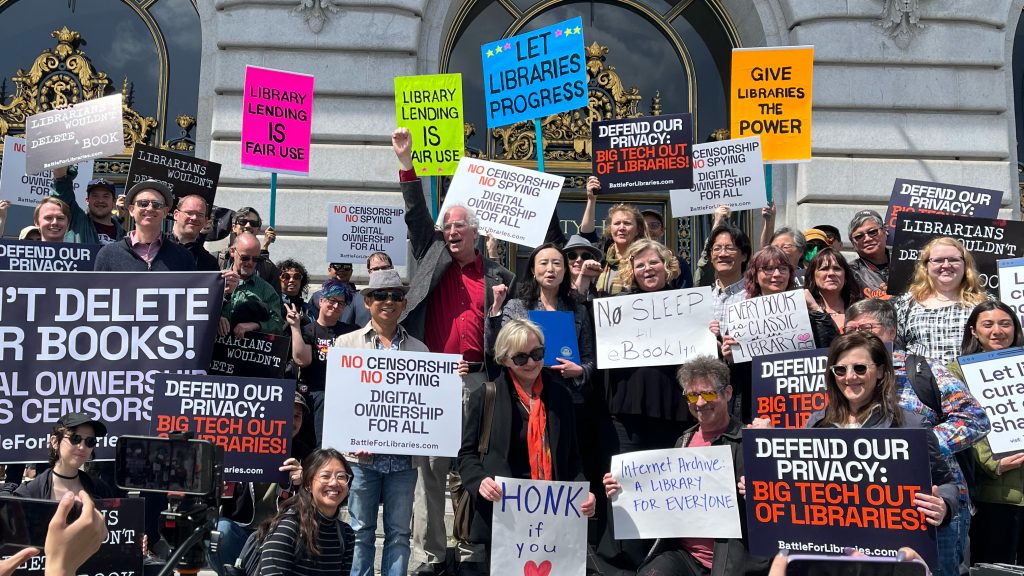 Supporters surround Internet Archive founder Brewster Kahle and District 1 Supervisor Connie Chan on the steps of City Hall.
Supporters surround Internet Archive founder Brewster Kahle and District 1 Supervisor Connie Chan on the steps of City Hall.
Before the vote, supporters rallied outside on the steps of City Hall. Joining Supervisor Chan on the steps were Brewster Kahle, Internet Archive; Cindy Cohn, Electronic Frontier Foundation; Chuck Roslof, Wikimedia Foundation; and author and activist Liz Henry.
“It’s a sad day that we have to be here to talk about the importance of maintaining access to information through libraries,” said Brewster Kahle, Digital Librarian of the Internet Archive. “We must stand firm in our commitment to providing Universal Access to All Knowledge.”
“The Internet Archive and its goal of universal access to all human knowledge represents the best of Technology.” said Cindy Cohn, Executive Director of the Electronic Frontier Foundation. “We must stand up for the privacy of our reading, the digital lending strategies that publishers want to promote violates our privacy and our ability to investigate freely.”
“The work of the Wikimedia Foundation centers around providing access to knowledge for all people, around the world.” said Chuck Roslof, Lead Counsel at the Wikimedia Foundation. “In this mission, Wikipedia doesn’t stand alone. Libraries and archives play a critical role as part of our ecosystem of free knowledge, to ensure that all of us have access to reliable, accurate information about the world around us. The Internet Archive is the internet’s library, and it is an invaluable resource to Wikipedia editors and readers…”
Author and disability justice activist Liz Henry spoke about the importance of digital libraries from their experience as a wheelchair user. “Access to digital lending from libraries and the Internet Archive is a critical lifeline for disabled people and seniors.” said Henry, going on to explain how they used the Internet Archive to research a brick that they found under their house during construction. Using materials from the web, as well as digital books from the Internet Archive and San Francisco Public Library, Henry was able to determine that the brick, stamped C H for City Hall, was manufactured in the 1870s, and was part of the original City Hall structure, which burned down in the 1906 earthquake. Henry completed their research while they were having mobility issues and limited to the house, underscoring the importance of digital access to library materials. You can read more about this fascinating discovery on Henry’s blog.
Many thanks to Supervisor Chan for being a strong advocate for libraries, and for making San Francisco the first municipality to codify the importance of digital libraries and controlled digital lending in a resolution. Many thanks as well to all the supporters who joined us on the steps and who submitted letters in support of the resolution.
The post San Francisco Board of Supervisors Unanimously Passes Resolution in Support of Digital Rights For Libraries appeared first on Internet Archive Blogs.
Law Professor Makes Digital Copyright Book Open for All
After spending years researching the history of U.S. copyright law, Jessica Litman says she wants to make it easy for others to find her work.
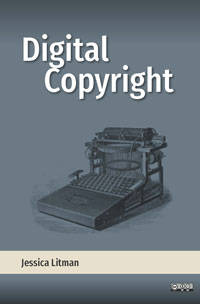 Digital Copyright is available to read now.
Digital Copyright is available to read now.
The law professor’s book, Digital Copyright, first published in 2001 by Prometheus Books, is available free online (read now). After it went out of print in 2015, University of Michigan Press agreed to publish an open access edition of the book. Litman updated all the footnotes (some of which were broken links to web pages only available through preservation on Internet Archive) and made the updated book available under a CC-BY-ND license in 2017.
“I wanted the book to continue to be useful,” Litman said. “Free copies on the web make it easy to read.”
Geared for a general audience, the book chronicles how copyright laws were drafted, written, lobbied and enacted in Congress over time. Litman researched the legislative history of copyright law, including development of the 1976 Copyright Act, and spent two years in Washington, D.C., observing Congress leading up to the passage of the Digital Millennium Copyright Act in 1998.
“Copyright is very complicated. It can take years to agree on the text,” Litman said. “The laws that result from that process are predictable in disadvantaging the public interest because readers, listeners and viewers don’t sit at the bargaining table — or the people who create new technology because they don’t exist yet.”
Indeed, it’s in the interest of people crafting laws to erect entry barriers to anything new, Litman adds.
Reclaiming RightsInitial response to her book was positive, said Litman, the John F. Nickoll Professor of Law at the University of Michigan. In 2006, she added an afterward with the release of a paperback edition of the book. As sales dwindled, the book went out of print. Still, Litman said there was demand and she wanted to make it broadly available to the public.
Taking advantage of the book contract’s termination clause, she wrote to the publisher to recapture rights to the book. Litman said she persuaded the University of Michigan Press to publish a revised online and print-on-demand edition with a new postscript under a Creative Commons CC-BY-ND license.
Many authors are not aware of this option and the nonprofit Authors Alliance, of which Litman was a founding member, helps provide resources to assist authors in the process of regaining their copyright.
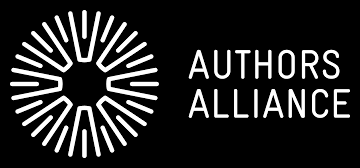
Typically, publishers require authors to sign contracts giving up their copyright so the company can publish, distribute and make a return on the investment of the book. One of the challenges over time, explains Dave Hansen, Executive Director of the Alliance, is that a publisher may stop printing a book when sales drop below a certain threshold. Yet, there may be potential readers that the author still wants to reach, if he or she could reclaim the copyright.
The Alliances offers free guides on Understanding Rights Reversion and Termination of Transfer.
Once the author has the rights back, there are low- or no-cost options to make it freely available. A copy can be donated to a collection at a library, such as the Internet Archive, for scanning and posting. Additionally, academic libraries are increasingly offering open access publishing services to reformat and post works online.
The Promise of OpenToday, Digital Copyright is being downloaded hundreds of times every month. Free copies of the book had been available on the web from the mid-2000, in a variety of open access archives including Michigan’s Deep Blue Repository. The book is also available for hard copy purchase from online booksellers as a print-on-demand book through University of Michigan Press’s Maize Books series.
Litman is among a growing number of academics who advocate for more open sharing of their research. On the University of Michigan Senate task force, Litman helped revise the university’s copyright policy to give the institution the right to archive all faculty scholarly work as a condition of transferring the copyright in the work to the faculty member who creates it. She also worked with the law school library to help its law journals rewrite their standard form contracts to allow open access publication.
Her advice to fellow authors: “Behave as if the law were more sensible than it is. Live in the world as you would like it to be, in hopes that the world will come around.”
Litman is an adviser for the American Law Institute’s Restatement of Copyright, a past trustee of the Copyright Society of the USA, a past chair of the Association of American Law Schools Section on Intellectual Property, and past member of the Future of Music Coalition’s advisory council.
She will discuss her open access publishing experience and her take on copyright law with Brewster Kahle at a free online book talk April 20. Register here.
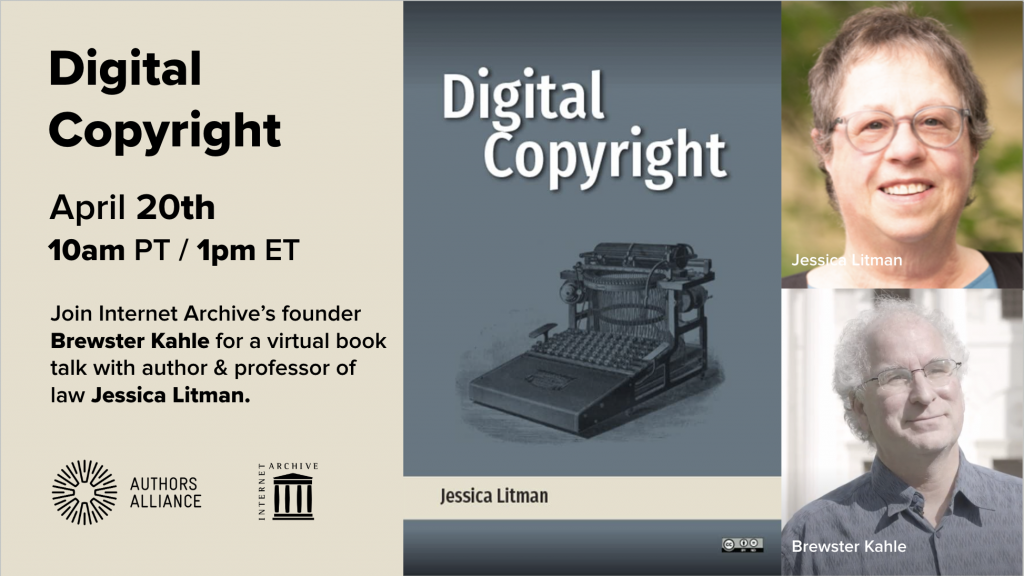
The post Law Professor Makes Digital Copyright Book Open for All appeared first on Internet Archive Blogs.
AI@IA — Extracting Words Sung on 100 year-old 78rpm records

Freely available Artificial Intelligence tools are now able to extract words sung on 78rpm records. The results may not be full lyrics, but we hope it can help browsing, searching, and researching.
Whisper is an open source tool from OpenAI “that approaches human level robustness and accuracy on English speech recognition.” We were surprised how far it could get with recognizing spoken words on noisy disks and even words being sung.
For instance in As We Parted At The Gate (1915) by Donald Chalmers, Harvey Hindermyer, and E. Austin Keith, the tool found the words:
[…] we parted at the gate,
I thought my heart would shrink.
Often now I seem to hear her last goodbye.
And the stars that tune at night will
never die as bright as they did before we
parted at the gate.
Many years have passed and gone since I
went away once more, leaving far behind
the girl I love so well.
But I wander back once more, and today
I pass the door of the cottade well, my
sweetheart, here to dwell.
All the roads they flew at fair,
but the faith is missing there.
I hear a voice repeating, you’re to live.
And I think of days gone by
with a tear so from her eyes.
On the evening as we parted at the gate,
as we parted at the gate, I thought my
heart would shrink.
Often now I seem to hear her last goodbye.
And the stars that tune at night will
never die as bright as they did before we
parted at the gate.
All of the extracted texts are now available– we hope it is useful for understanding these early recordings. Bear in mind these are historical materials so may be offensive and also possibly incorrectly transcribed.
We are grateful that University of California Santa Barbara Library donated an almost complete set of transfers of 100 year-old Edison recordings to the Internet Archive’s Great 78 Project this year. The recordings and the transfers were so good that the automatic tools were able to make out many of the words.
The next step is to integrate these texts into the browsing and searching interfaces at the Internet Archive.
The post AI@IA — Extracting Words Sung on 100 year-old 78rpm records appeared first on Internet Archive Blogs.
Generative AI Meets Open Culture
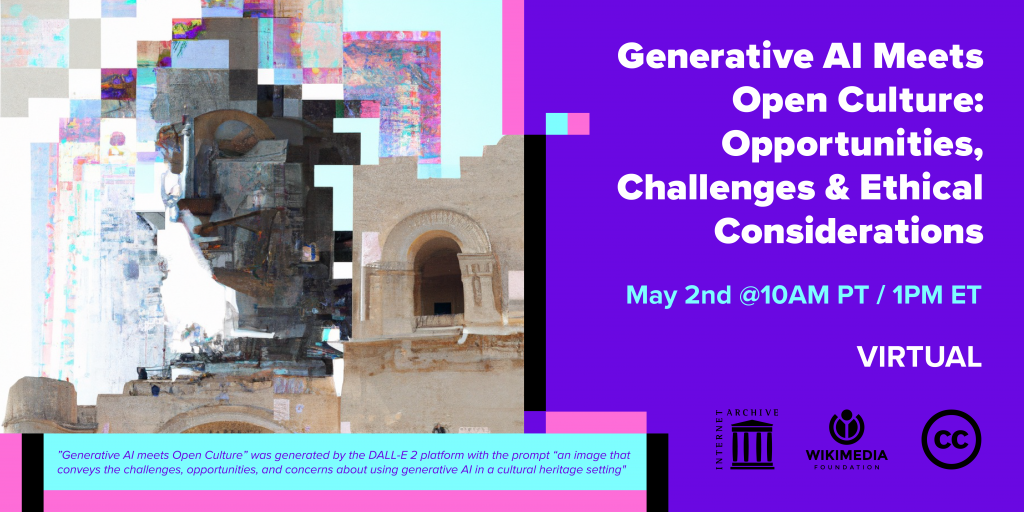
How can public interest values shape the future of AI?
With the rise of generative artificial intelligence (AI), there has been increasing interest in how AI can be used in the description, preservation and dissemination of cultural heritage. While AI promises immense benefits, it also raises important ethical considerations.
In this session, leaders from Internet Archive, Creative Commons and Wikimedia Foundation will discuss how public interest values can shape the development and deployment of AI in cultural heritage, including how to ensure that AI reflects diverse perspectives, promotes cultural understanding, and respects ethical principles such as privacy and consent.
Join us for a thought-provoking discussion on the future of AI in cultural heritage, and learn how we can work together to create a more equitable and responsible future.
Speakers include:
- Lila Bailey, Internet Archive
- Jacob Rogers, Wikimedia Foundation
- Kat Walsh, Creative Commons
- Luis Villa (moderator), Tidelift
Generative AI Meets Open Culture
May 2 @ 10am PT / 1pm ET
Register now for the free, virtual webinar
The post Generative AI Meets Open Culture appeared first on Internet Archive Blogs.
Supporters Rally For Library Digital Rights on the Steps of the Internet Archive
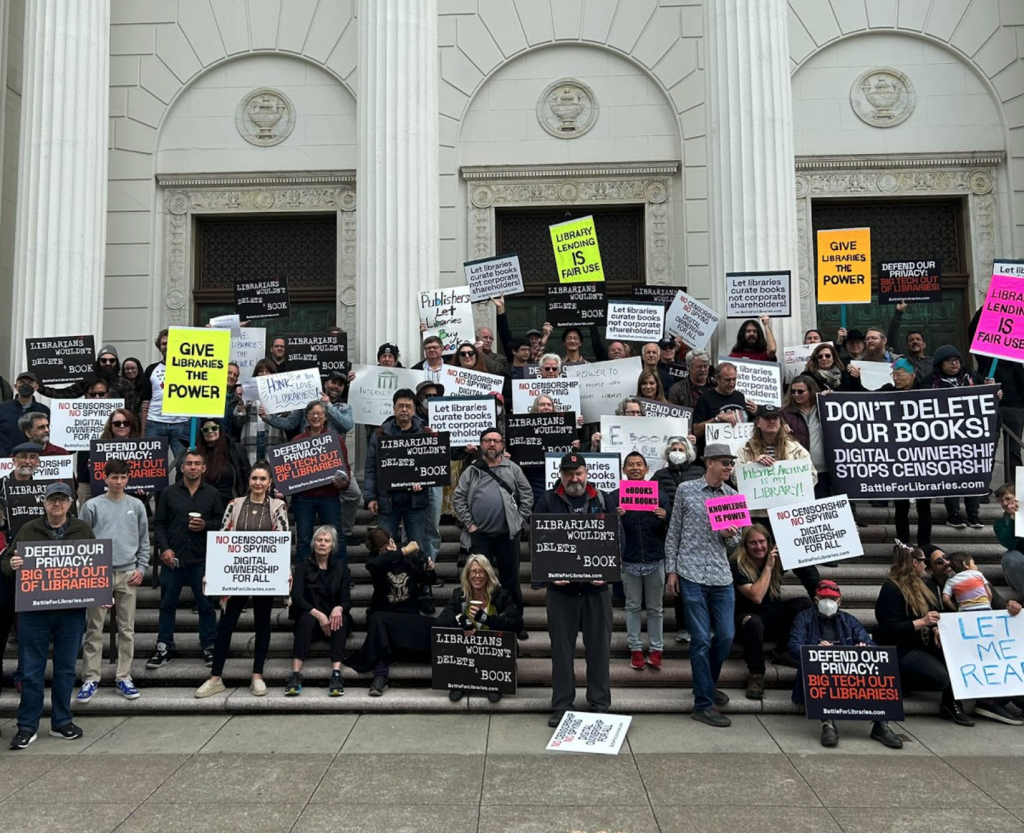
More than one hundred supporters gathered on the steps of the Internet Archive last Saturday to rally support for our library in the face of a judgment that threatens the digital future of all libraries.
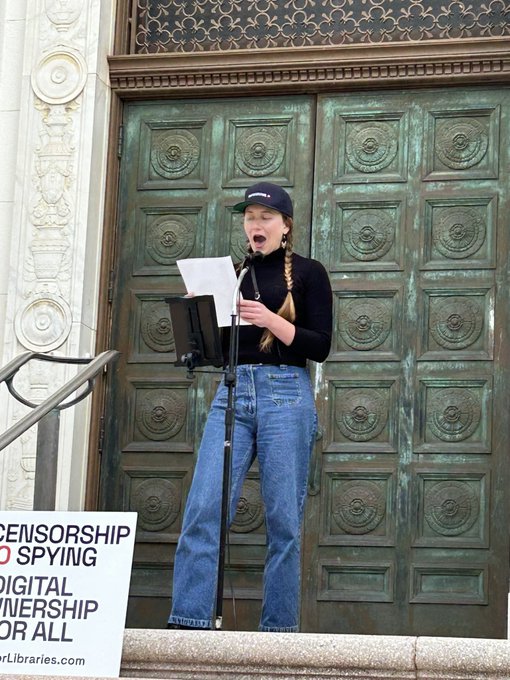
Digital rights advocate Lia Holland of Fight for the Future read from the letter signed by Neil Gaiman, Naomi A. Klein, Chuck Wendig, Karen Joy Fowler, Cory Doctorow and more than 1,000 additional authors who are speaking out on behalf of libraries, demanding that publishers and trade associations put the digital rights of librarians, readers, and authors ahead of shareholder profits.
Cindy Cohn, the Executive Director of the Electronic Frontier Foundation (EFF), who are representing Internet Archive in our lawsuit, underscored the valuable role that libraries play in protecting reader privacy; values that are not shared by the corporations and platforms that have become intertwined around ebooks. “When libraries can’t own ebooks, how private will your reading be?” Cohn asked. “Everyone deserves the right to read without someone looking over their shoulder.”
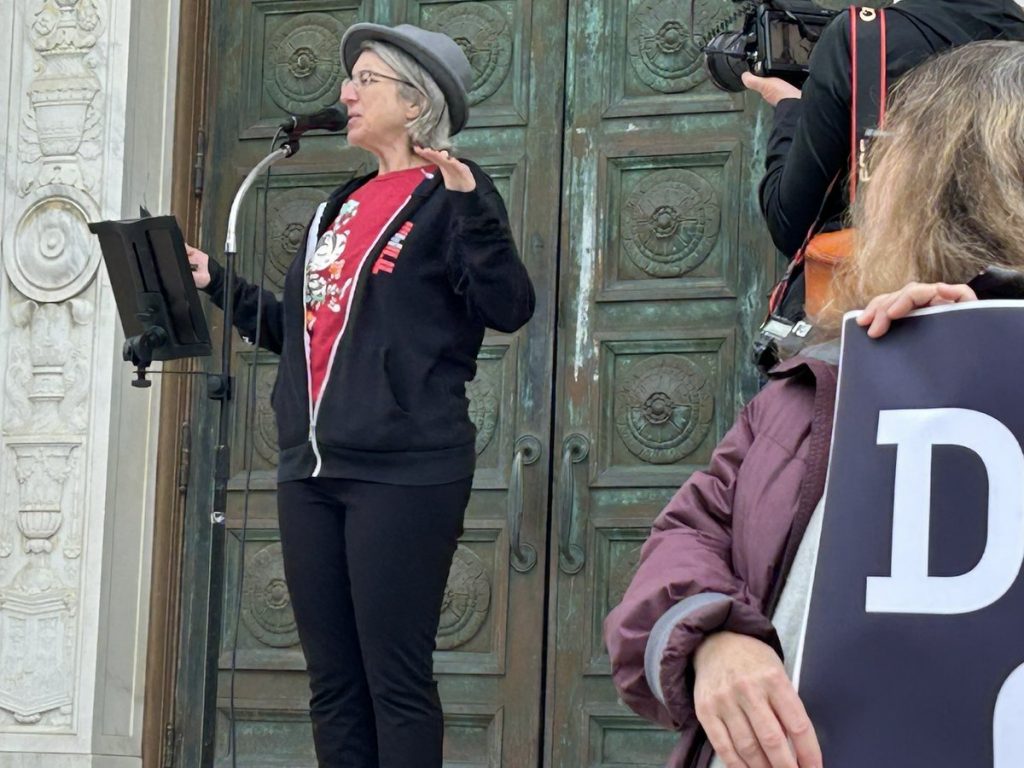
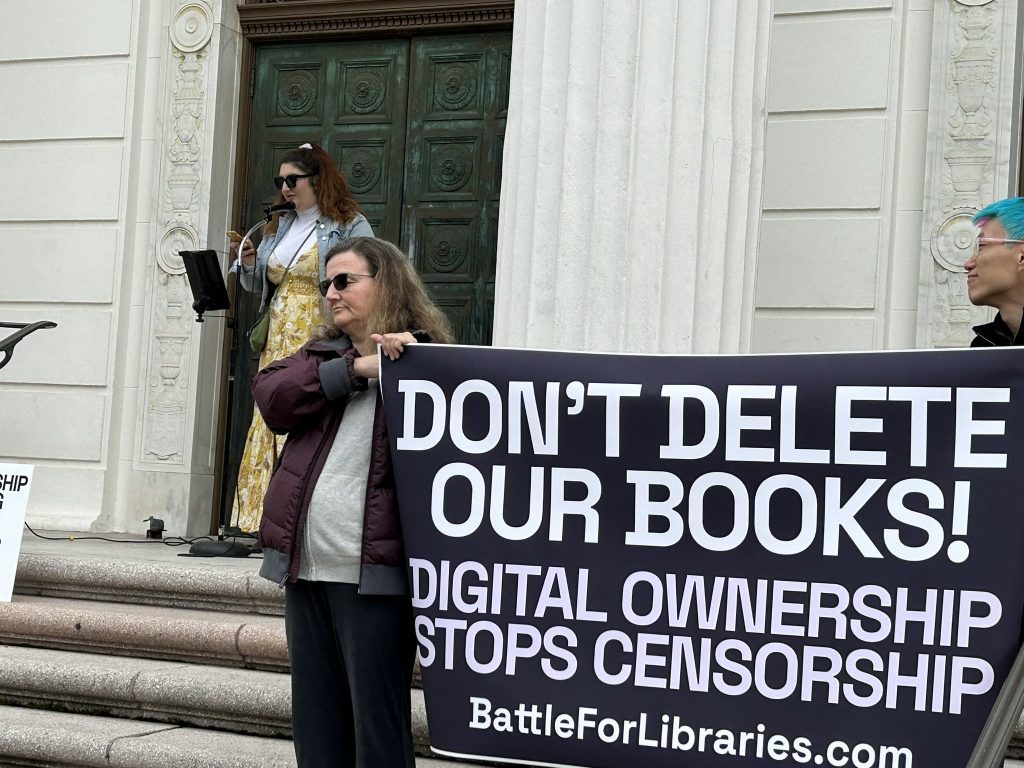
The Internet Law & Policy Foundry’s Lili Siri Spira spoke from her perspective as a “Gen-Z-Millennial cusper growing up on the Internet” about the importance of access to quality information in the face of book bannings and attacks on libraries. “As a former open-source investigator, I know first-hand how important open and free access to knowledge is in order to address the world’s injustices…As a former misinfo analyst, I know what information is out there to replace these burned books and it’s not good,” she said.
Brewster Kahle, the founder and digital librarian of the Internet Archive, gave an impassioned plea about why the lawsuit against the Internet Archive is harmful to libraries and the entire publishing ecosystem. “[The lawsuit] doesn’t make any sense for authors, it doesn’t make any sense for readers, it doesn’t make any sense for libraries, and it doesn’t make any sense for publishers. The library system…has always bought lots of books. But now, [the publishers] are saying you cannot buy an ebook. This makes no sense!”
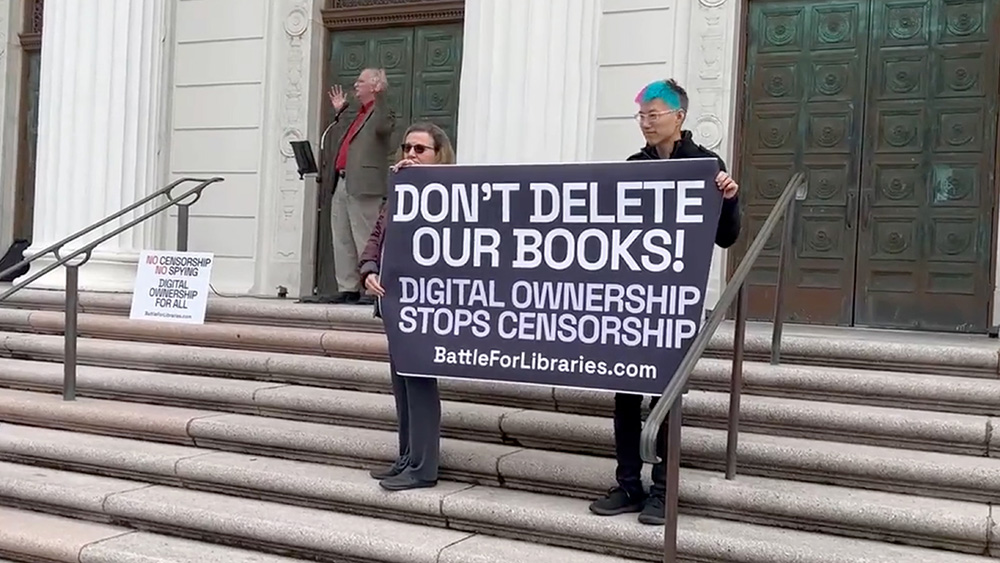
The rally wrapped with cheers for continued action in support of libraries’ digital rights. As EFF’s Cindy Cohn shouted to roars from the crowd, “On to the court of appeals!”
The post Supporters Rally For Library Digital Rights on the Steps of the Internet Archive appeared first on Internet Archive Blogs.
Don’t Delete Our Books! Rally
For those asking how you can support the Internet Archive, there will be a rally on the steps of the Internet Archive on Saturday, April 8 @ 11am PT.
Learn more & sign upReposted from https://actionnetwork.org/events/dont-delete-our-books-rally-in-san-francisco
Rally for the digital future of libraries!
The nonprofit Internet Archive is appealing a judgment that threatens the future of all libraries. Big publishers are suing to cut off libraries’ ownership and control of digital books, opening new paths for censorship and surveillance. If this ruling is allowed to stand, it will result in:
— Increased censorship or even deletion of books, decided only by big publishing shareholders
— Big Tech growing its overreach into library patron’s data, making people unsafe by monitizing intimate personal information on what they read or research
— Even more predatory licensing fees from Big Media monopolies, who are gobbling up public and school library budgets
— Reduced access to books for people from every community
— Losing libraries as preservers of vast swaths of history and culture, because they will never be allowed to own and preserve digital books
More information is available at BattleForLibraries.com. The organizers of that website are holding a rally at the Internet Archive on Funston St in San Francisco on Saturday, April 8, 2023 at 11 am.
All are welcome. Bring signs (we’ll also have some to share!) and join us to stand up for the rights of libraries to own and preserve books—whether they’re digital or print.
You can still participate & show your support for the digital rights of libraries in the following ways:
- Get live updates from the rally at #DigitalRightsForLibraries
- Make & share a rally sign & tag @internetarchive on social media
Need a suggestion? Try:
Internet Archive is a Library For Everyone!
eBooks are Books
- Join the Battle for Libraries to stand up for all libraries.
The post Don’t Delete Our Books! Rally appeared first on Internet Archive Blogs.
How Can You Help The Internet Archive? (A Repost)
In June of 2020, facing a range of challenges, we posted a host of information about how you could help the Internet Archive through difficult and pressing times.
Pretty much all of the suggestions and links in that essay still hold up and are relevant this month as well, and we are the Historical Web people, so here is a full link to that post again:
http://blog.archive.org/2020/06/14/how-can-you-help-the-internet-archive/
Your words of support and letting us know what we mean to you are appreciated, and read with great happiness. Thanks.
The post How Can You Help The Internet Archive? (A Repost) appeared first on Internet Archive Blogs.
Internet Archive Press Conference: March 20, 2023
Internet Archive hosted a press conference before oral argument in Hachette v. Internet Archive, the lawsuit against our library.
Speakers:
Link to statement & transcript.
- Brewster Kahle, the founder & digital librarian of the Internet Archive;
- Lila Bailey, senior policy counsel at the Internet Archive;
- Lawrence Lessig, Harvard Law
- Heather Joseph, executive director of SPARC
- Catherine Stihler, chief executive officer, Creative Commons
- John Chraskta, executive director of EveryLibrary
- Author Ashton Applewhite
- And author and educator Laura Gibbs.
The post Internet Archive Press Conference: March 20, 2023 appeared first on Internet Archive Blogs.
Press conference statement: Brewster Kahle, Internet Archive
Brewster Kahle is the founder and digital librarian of the Internet Archive. Brewster spoke at the press conference hosted by Internet Archive ahead of oral argument in Hachette v. Internet Archive.
Statement
The Internet is failing us. The Internet Archive has tried, along with hundreds of other libraries, to do something about it.
A ruling in this case ironically can help all libraries, or it can hurt.
The Internet Archive is a library I founded 26 years ago. This library has brought hundreds of years of books to the wikipedia generation, and now 4 massive publishers are suing to stop us.
As the world now looks to their screens for answers, what they find is often not good. People are struggling to figure out what is true and it is getting harder.
Digital learners need access to a library of books, a library at least as deep as the libraries we older people had the privilege to grow up with.
The Internet Archive has worked with hundreds of libraries for decades to provide such a library of books. A library where each of those books can be read by one reader at a time. This is what libraries have always done.
We also work with libraries that are under threat. We work with many libraries that have closed their doors completely– libraries with unique collections: Claremont School of Theology, Marygrove College of Detroit, cooking school of Johnson & Wales Denver, Concordia College of Bronxville NY, Drug Policy Alliance’s library of NYC, the Evangelical Seminary of Pennsylvania. I have looked these librarians in the eye and told them that we are there for them.
They entrust their books to us, as a peer library, to carry forward their mission. Most of the books are not available from the publishers in digital form, and never will be. And as we have seen, students, researchers and the print-disabled continue to use these books for quotations and fact checking. And I think we can all agree we need to be able to do fact checking.
Here’s what’s at stake in this case: hundreds of libraries contributed millions of books to the Internet Archive for preservation in addition to those books we have purchased. Thousands of donors provided the funds to digitize them.
The publishers are now demanding that those millions of digitized books, not only be made inaccessible, but be destroyed.
This is horrendous. Let me say it again– the publishers are demanding that millions of digitized books be destroyed.
And if they succeed in destroying our books or even making many of them inaccessible, there will be a chilling effect on the hundreds of other libraries that lend digitized books as we do.
This could be the burning of the Library of Alexandria moment– millions of books from our community’s libraries – gone.
The dream of the Internet was to democratize access to knowledge, but if the big publishers have their way, excessive corporate control will be the nightmare of the Internet.
That is what is at stake. Will libraries even own and preserve collections that are digital? Will libraries serve our patrons with books as we have done for millennia?
A positive ruling that affirms every library’s right to lend the books they own, would build a better Internet and a better society.
Thank you.
The post Press conference statement: Brewster Kahle, Internet Archive appeared first on Internet Archive Blogs.
Press conference statement: Lila Bailey, Internet Archive
Lila Bailey is the senior policy counsel at Internet Archive. Lila spoke at the press conference hosted by Internet Archive ahead of oral argument in Hachette v. Internet Archive.
Statement
I’m Lila Bailey, Senior Policy Counsel for the Internet Archive. Today, the court will hear arguments about whether Copyright Law affirms the rights of libraries to lend the books they own to one reader at a time.
The benefits of libraries to our modern world cannot be overstated. Libraries are an essential component of our democratic and free society. But the rise of social media, and now AI, have resulted in an immediate threat to the public’s pursuit of the truth.
In a vigorous pursuit of truth, the library is our greatest ally.
The Internet Archive’s digital lending program serves this essential purpose. The very purpose of the copyright system: to encourage the intellectual enrichment of the public.
Controlled digital lending represents the latest in a long history of innovations developed by libraries to serve the public’s need for information. In the past, publishers stood against microfilm and photocopiers, crying harm. They said they would be harmed by interlibrary loan. They lobbied for decades against libraries being allowed to provide access for the blind and print disabled. They were wrong. It took years, but eventually the law affirmed each of these things, and the public benefitted.
With this lawsuit, publishers have repeated those same claims of massive harm from controlled digital lending.
But this case has revealed one thing very clearly, after both sides have spent nearly three years, and millions of dollars looking at the actual market and usage data.
There has been no harm. These publishers have not shown the loss of even one dollar.
Even during COVID, when every physical library was closed and the Internet Archive stepped up to provide an Emergency Library.
Contrary to the publishers’ dire predictions there was simply no effect on their market. Not one dollar of harm.
When asked under oath, their own executives admit this. For example, Alison Lazarus, EVP and Director of Group Sales for Hachette, admitted that their theory of harm is only [quote] “speculative.” Another executive, Skip Dye, SVP of Library Sales and Digital Strategy at Penguin Random House, candidly admitted that when it comes to market harm, quote: “I don’t have any evidence.”
Another agreed, stating: “There’s no factual analysis. It’s just one inference one could make.” That was Chantal Restivo-Alessi, Chief Digital Officer of HarperCollins.
Tellingly, the publishers instructed their own 950 dollar per hour expert not to even try to measure economic harm. They didn’t give him any data to measure. When asked under oath whether any potential sales were lost, he responded: “I don’t have empirical evidence of that.”
On the other hand, when we invited economists from Northeastern University and the University of Copenhagen to look at the sales and library lending data produced in this case, they came to a singular conclusion: The Internet Archive’s digital lending had no measurable effect on the market whatsoever.
Never in the history of the United States have libraries needed to obtain special permission or to pay license fees to lend the books they already own. Sure, publishers would profit from the ability to demand such fees, but the law does not give them that right.
We look forward to the court reaffirming the essential role of library lending, now in our digital world.
Thank you.
The post Press conference statement: Lila Bailey, Internet Archive appeared first on Internet Archive Blogs.
Press conference statement: Lawrence Lessig, Harvard Law
Lawrence Lessig is a professor of law at Harvard Law. Lawrence spoke at the press conference hosted by Internet Archive ahead of oral argument in Hachette v. Internet Archive.
Statement
Also available at Lessig for the Internet Archive on Medium.
We should all recognize — and celebrate—the importance of commercial publishing, for authors and creators everywhere. Commercial publishing creates the income that authors depend upon to have the freedom to create great new works. Without commercial publishing, much of the greatest that will be won’t be written.
But we must also recognize that culture needs more than commercial publishing. If the business model of commercial publishing controlled our access to our past, then much of who we were, and much of how we learned to be better, would simply disappear.
Think about the extraordinary platform that is Netflix. For a small price each month, subscribers have access to thousands of movies and television shows, far more than at any point in human history. The revenue subscribers provide in turn lets Netflix invest in new creative work. No one who knew television from the 1970s could believe that the quality of television has not improved dramatically over the last 50 years.
Yet Netflix’ archive is not endless. And each year, the site culls titles from its collection and removes them from its library. Netflix does this for many reasons — for example, the content could be licensed from third parties, and the term of that license has expired, or the site may see that demand for the title is meager, so bearing the costs of carrying it no longer makes sense. Regardless of the reason, the decision is an economic one for Netflix — Netflix makes available only those titles that it continues to make economic sense to make available. Such is the business model of a commercial publisher.
But culture needs a different business model. We need access to our past, not just the part of our past that continues to be commercially viable. We need libraries that assure we can see everything our parents or grandparents saw, so we can understand why they were as they were, and how they got better. Great libraries preserve access to as much as they physically can — not based on which titles continue to earn revenue. The past is just one more competitor for a commercial publisher; but for a library, the past is a gift that is to be nurtured and protected, regardless of its commercial value.
We are at a critical moment in the history of culture. The lawsuit that the Internet Archive faces will determine whether the business model of culture is the commercial model alone, or whether there will continue to be a place for libraries, and therefore, continue to be a practice of assuring as much access to our past as is possible. The particular fight in this lawsuit is important; the general fight is critical: Is the past that we have access to just the past that continues to pay? Or is the past we can have reliable access to the past that libraries strive to make available — not for profit, but for the love of culture and for the truth that that access to all of culture continues to assure.
The post Press conference statement: Lawrence Lessig, Harvard Law appeared first on Internet Archive Blogs.
Press conference statement: Heather Joseph, SPARC
Heather Joseph is the executive director of SPARC. She spoke at the press conference hosted by Internet Archive ahead of oral argument in Hachette v. Internet Archive.
Statement
Access to knowledge is a fundamental human right.
We depend on being able to freely share knowledge each and every day. It’s foundational to how we navigate the world – from how we learn to how we work, to how we share our culture and understand our collective history. It’s also the lifeblood of how we advance discovery, and attack the biggest challenges that we face as a society. From cancer breakthroughs to climate justice, we rely on being able to access, build on and benefit from the knowledge generated by those around us.
We take for granted that knowledge is just – there, and that ANYONE can get it when and if they need it. But the reality is that too often, this simply isn’t the case. Especially in the world of scientific research, knowledge is treated as a commodity, and often carries a price tag that makes it unaffordable to all but the wealthiest individuals and institutions.
This is never more evident than in times of crises. From the avian flu to the global COVID 19 pandemic, we’ve seen the same pattern play out over and over again. When a health crisis looms, one of the very first thing that happens is that scientists, the public and policymakers have to plead with publishers to lower their paywalls and make sure that those who desperately need access to knowledge can get it. Whether it’s access to develop treatments and cures, or to make sure students can continue to learn, knowledge shouldn’t be kept locked behind glass that can only be broken in the event of an emergency. It should be readily available to all.
Libraries play a critical role in making this happen. They are designed to empower everyone – regardless of who you are, where you live, or your economic or political status – to access and use knowledge. Whether you walk into a physical library like the New York Public Library, or log into a digital one like the Internet Archive, you don’t need a PhD or a billion-dollar bank account to access the knowledge they hold.
We depend on libraries to do the crucial things they have done for centuries. Libraries collect. They preserve. And libraries lend. They collect materials to ensure access to the broadest range of ideas and facts. They preserve these materials for the long haul, because access to knowledge should not be ephemeral. Stable, consistent, long-term access is how we promote continuity and ultimately understand truth. Lending – one copy of a physical or digital object to one person at time is the bedrock process that libraries use to ensure free, fair and equitable knowledge sharing.
Libraries like the Internet Archive exist to ensure the universal sharing of knowledge. Sharing knowledge is a fundamental human right. Nothing could be more important to protect than that.
The post Press conference statement: Heather Joseph, SPARC appeared first on Internet Archive Blogs.
Press conference statement: Catherine Stihler, Creative Commons
Catherine Stihler is the chief executive officer of Creative Commons. Catherine spoke at the press conference hosted by Internet Archive ahead of oral argument in Hachette v. Internet Archive.
Statement
My name is Catherine Stihler, and I’m the CEO of Creative Commons.
As a nonprofit dedicated to supporting the sharing and reuse of creativity and knowledge, we strongly support the Internet Archive in its defense of Controlled Digital Lending. Free, equitable, and open access to all knowledge stimulates creativity, is essential for research and learning, and constitutes a bedrock principle of free and democratic societies.
The Internet Archive is leading the fight for establishing permanent access to historical collections that exist in digital format. With Controlled Digital Lending, libraries like the Internet Archive can lend one copy of digitized material from their collection to one borrower for a limited time, just like they would a physical book.
While publishers argue that CDL decreases their profits, studies show that in fact library digitization increases sales of physical editions by about 34% and increases the likelihood of any sale by 92%, particularly for less popular or out-of-print works. At Creative Commons, we believe copyright should encourage Controlled Digital Lending and ensure that legal mechanisms are in place to support this practice that benefits all.
This isn’t a position that we just came to on our own; instead, it came from working hand in hand with cultural and knowledge institutions across the world. Like Communia’s policy recommendations state: “libraries should be enabled to fulfill their mission in the digital environment.” As libraries modernize their services, we need to protect the legal frameworks that support their digital lending practices.
Permitting and protecting Controlled Digital Lending is a key way to help ensure copyright is fit for the modern age. Guided by our strong belief in better sharing, CC will continue to support the Internet Archive’s crucial efforts to ensure the public can access knowledge and culture on a global level.
The post Press conference statement: Catherine Stihler, Creative Commons appeared first on Internet Archive Blogs.
Press conference statement: John Chrastka, EveryLibrary
John Chrastka is the executive director of EveryLibrary. John spoke at the press conference hosted by Internet Archive ahead of oral argument in Hachette v. Internet Archive.
Statement
My organization, the EveryLibrary Institute, is a public policy and tax policy research organization focusing on issues affecting the future of libraries in the United States and abroad.
Alongside our colleagues at ReadersFirst, we joined an Amicus brief written by the Library Futures Institute, to ask the court to uphold a library digital loaning practice known as Controlled Digital Lending – or “CDL”. CDL uses technology to enable a library to acquire, preserve, and provide access to digital versions books for library patrons.
Simply put, CDL is a different way of utilizing the centuries-old method by which libraries have loaned the books on their shelves for the public to read.
Controlled Digital Lending – as is commonly used in libraries like the Internet Archive – does not replace ebook licenses, and is a reasonable practice for the current moment. For more than a century, Copyright law has allowed libraries to legally lend books and other materials they own. This practice of library lending is essential in ensuring public access to information, particularly books – and has numerous social benefits. With the growth of digital delivery, libraries have adapted by lending materials using new technologies and formats.
However, this lawsuit seeks to outlaw digital library lending unless they dictate how, where, to whom, and at what price it occurs. This would significantly alter how libraries work and their relationships with their patrons and collections in the digital age.
I’d like to take a moment to remind the court about the context of the “Emergency Lending Library” and to ask it to consider the context under which the Internet Archive, as a library, was responding to need. From the launch of the Emergency Lending Library on March 24, 2020 to June 16, 2020, essentially every school district in the United States was closed to in-person learning. The Philadelphia school district was completely shut down with no substantial instruction happening. The school district of Washington, DC shifted part of their instructions to Television. According to Georgetown University’s analysis of MAP tests, Chicago Public School students lost the equivalent of 21 weeks of learning in the year following these shutdowns.
The “Emergency Lending Library” from the Internet Archive provided a unique, important, and necessary service to Americans in this context. It was an exemplar moment for libraries which mitigated the harm of these shutdowns for students and their families.
The plaintiffs’ narrow interpretation of the Copyright Act ignores the broader common law doctrine, policy objectives, and history of copyright. Both Congress and the Supreme Court have historically balanced the interests of copyright holders and owners.
The court should not rewrite more than a century of copyright law about libraries. Doing so will make it nearly impossible for libraries to fulfill their mission – especially in times of grave need and crisis – in the digital environment.
The post Press conference statement: John Chrastka, EveryLibrary appeared first on Internet Archive Blogs.
Press conference statement: Ashton Applewhite, author
Ashton Applewhite is one of more than 1,000 authors who spoke out in opposition to the publishers’ lawsuit. Ashton spoke at the press conference hosted by Internet Archive ahead of oral argument in Hachette v. Internet Archive.
Statement
My name is Ashton Applewhite, and I’m recording this in New York City on March sixteenth, 2023 for over 40 years I have supported myself and my family by writing books for Random House, Harper Collins, Macmillan and other major publishing houses.
These publishers have served me well, but I am completely opposed to their lawsuit against the Internet Archive.
It will have a chilling effect on the efforts of all libraries to adapt as print culture migrates online, and it will also devastate the Internet Archive, which, as we hurtle into this digital unknown, is the single most important repository of human knowledge. No other organization is preserving and providing online access at this scale.
The Wayback Machine alone has archived 800 billion pages, millions of books, tens of thousands of hours of TV and radio news. And on and on. Humanity’s collective history, digitized, thank Heavens!
The Internet Archive exists. We need to be able to say that 100 years from now.
The post Press conference statement: Ashton Applewhite, author appeared first on Internet Archive Blogs.
Press conference statement: Laura Gibbs, author & educator
Laura Gibbs is an author and educator. She spoke at the press conference hosted by Internet Archive ahead of oral argument in Hachette v. Internet Archive.
Statement
My name is Laura Gibbs, and for many years I taught mythology and folklore courses at the University of Oklahoma. Since I retired two years ago, I’ve been doing bibliography work at the Internet Archive, looking for the best mythology and folklore books that readers can borrow from the Archive’s library with Controlled Digital Lending.
Last year, I published A Reader’s Guide to African Folktales at the Internet Archive, which is an annotated bibliography of 200 books available at the Archive, beautiful books of folktales, myths, fables, legends, games, songs, riddles, and proverbs from all over the African continent. Some of the books come from African publishers and are hard to find in any library, but there they are: digitized and ready to read at the Internet Archive.
This year, I’ll be publishing a follow-up volume, A Reader’s Guide to African Diaspora Folktales, with another 200 books of folktales, this time from African American and Caribbean storytellers, books that teachers, students, scholars, parents, people anywhere in the world can read online at the Archive.
In the year 2023, we should NOT have to be limited just to the books available to us in our local libraries. We need a positive ruling in this case so that the Internet Archive can keep building their digital library AND so that other libraries can also make their resources available online, connecting more people with more books than ever before. The readers, writers, and researchers of the world need the Internet Archive, and we need Controlled Digital Lending.
The post Press conference statement: Laura Gibbs, author & educator appeared first on Internet Archive Blogs.







































































































![Reference manager - [Onderhoud aantekeningen]](https://www.labyrinth.rienkjonker.nl/sites/default/files/styles/medium/public/Reference%20manager%20v3%20-%20%5BOnderhoud%20aantekeningen%5D%2014-2-2010%20102617_0.jpg?itok=OJkkWhxY)
![Reference manager - [Onderhoud aantekeningen]](https://www.labyrinth.rienkjonker.nl/sites/default/files/styles/medium/public/Reference%20manager%20v3%20-%20%5BOnderhoud%20aantekeningen%5D%2014-2-2010%20102628.jpg?itok=CUvhRRr7)
![Reference manager - [Onderhoud bronnen] - Opnemen en onderhouden](https://www.labyrinth.rienkjonker.nl/sites/default/files/styles/medium/public/Reference%20manager%20v3%20-%20%5BOnderhoud%20bronnen%5D%2014-2-2010%20102418.jpg?itok=d7rnOhhK)
![Reference manager - [Onderhoud bronnen]](https://www.labyrinth.rienkjonker.nl/sites/default/files/styles/medium/public/Reference%20manager%20v3%20-%20%5BOnderhoud%20bronnen%5D%2014-2-2010%20102433.jpg?itok=CgS8R6cS)
![Reference manager - [Onderhoud bronnen]](https://www.labyrinth.rienkjonker.nl/sites/default/files/styles/medium/public/Reference%20manager%20v3%20-%20%5BOnderhoud%20bronnen%5D%2014-2-2010%20102445_0.jpg?itok=4oJ07yFZ)
![Reference manager - [Onderhoud bronnen]](https://www.labyrinth.rienkjonker.nl/sites/default/files/styles/medium/public/Reference%20manager%20v3%20-%20%5BOnderhoud%20bronnen%5D%2014-2-2010%20102500.jpg?itok=ExHJRjAO)
![Reference manager - [Onderhoud bronnen]](https://www.labyrinth.rienkjonker.nl/sites/default/files/styles/medium/public/Reference%20manager%20v3%20-%20%5BOnderhoud%20bronnen%5D%2014-2-2010%20102524.jpg?itok=IeHaYl_M)
![Reference manager - [Onderhoud bronnen]](https://www.labyrinth.rienkjonker.nl/sites/default/files/styles/medium/public/Reference%20manager%20v3%20-%20%5BOnderhoud%20bronnen%5D%2014-2-2010%20102534.jpg?itok=cdKP4u3I)
![Reference manager - [Onderhoud thema's en rubrieken]](https://www.labyrinth.rienkjonker.nl/sites/default/files/styles/medium/public/Reference%20manager%20v3%20-%20%5BOnderhoud%20themas%20en%20rubrieken%5D%2020-9-2009%20185626.jpg?itok=zM5uJ2Sf)













![Reference manager - [Raadplegen aantekeningen]](https://www.labyrinth.rienkjonker.nl/sites/default/files/styles/medium/public/Reference%20manager%20v3%20-%20%5BRaadplegen%20aantekeningen%5D%2020-9-2009%20185612.jpg?itok=RnX2qguF)
![Reference manager - [Relatie termen (thesaurus)]](https://www.labyrinth.rienkjonker.nl/sites/default/files/styles/medium/public/Reference%20manager%20v3%20-%20%5BRelatie%20termen%20%28thesaurus%29%5D%2014-2-2010%20102751.jpg?itok=SmxubGMD)
![Reference manager - [Thesaurus raadplegen]](https://www.labyrinth.rienkjonker.nl/sites/default/files/styles/medium/public/Reference%20manager%20v3%20-%20%5BThesaurus%20raadplegen%5D%2014-2-2010%20102732.jpg?itok=FWvNcckL)
![Reference manager - [Zoek thema en rubrieken]](https://www.labyrinth.rienkjonker.nl/sites/default/files/styles/medium/public/Reference%20manager%20v3%20-%20%5BZoek%20thema%20en%20rubrieken%5D%2020-9-2009%20185546.jpg?itok=6sUOZbvL)
![Reference manager - [Onderhoud rubrieken]](https://www.labyrinth.rienkjonker.nl/sites/default/files/styles/medium/public/Reference%20manager%20v3%2020-9-2009%20185634.jpg?itok=oZ8RFfVI)

![Reference manager - [Onderhoud aantekeningen]](https://www.labyrinth.rienkjonker.nl/sites/default/files/styles/medium/public/Reference%20manager%20v3%20-%20%5BOnderhoud%20aantekeningen%5D%2014-2-2010%20102603.jpg?itok=XMMJmuWz)


































































